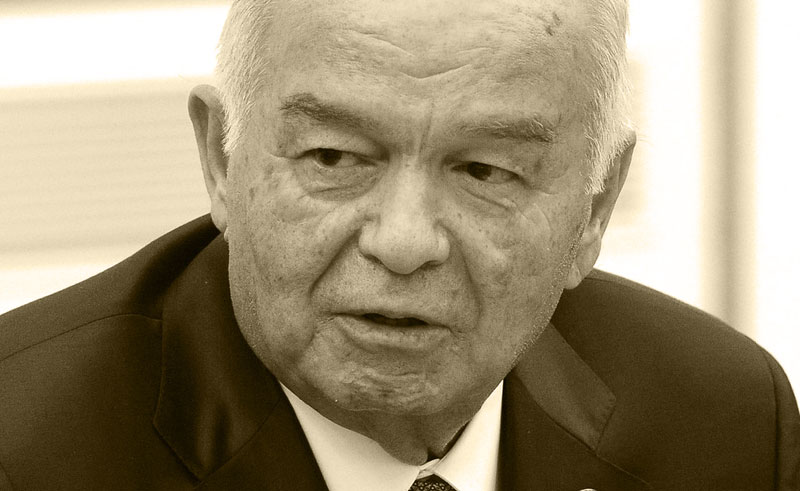By Umida Niyazova
Islam Karimov, Uzbekistan’s late authoritarian ruler, preyed on his people. Secretive, corrupt, and brutal, he allowed those close to him to enrich themselves at the public’s expense to the tune of $850 million, according to lawsuits filed by the U.S. Department of Justice.
Even now, after his death, there are no signs that the new rulers are going to change the system of corruption and extraction Karimov set up. But the United States can help Uzbek citizens recover some of what Karimov and his associates have stolen from them over the years through a pair of criminal lawsuits seeking to recover $850 million in bribes, including $300 million that passed through U.S. financial institutions before being deposited in European banks.
Since the Sept. 11 terrorist attacks, the United States has often overlooked Karimov’s abuses—including forced labor, theft of public resources, and extrajudicial killings—to grease the wheels of a relationship that let non-lethal military cargo flow from Uzbekistan into Afghanistan. The exigencies of wartime diplomacy ran roughshod over human rights and good governance. Though there have been some exceptions: the U.S. did a decent thing by helping 500 Andijan refugees, who escaped the government-executed massacre in May 2005, resettling to the West.
As allies went, Karimov was a choice candidate, if Uzbekistan propaganda and Russian media are to be believed: a necessary evil who maintained regional peace and held his country together against the centrifugal forces of ethnic nationalism and radical Islam. In truth, Karimov’s rule did much to drive regional instability and, ultimately, harmed U.S. longer-term national security interests.
In all the years of Karimov’s rule, Uzbekistan was never threatened by civil war. The country is not divided on ethnic, regional, or sectarian lines like other post-Soviet republics, such as Tajikistan, Azerbaijan, Moldova, or Georgia. If anything, Karimov’s severe repression—with no distinctions made between peaceful and extremist currents of Islam—contributed to the radicalization of some Uzbek citizens, including those who joined ISIS or other militant groups after losing faith in the prospect of justice under Karimov’s rule.
Moreover, Uzbekistan became renowned for its corruption with Karimov as its leader—in recent years, the country consistently has ranked below 153 (out of 168 countries) in Transparency International’s Corruption Perception Index. In part through a massive bribery scheme involving Karimov’s daughter and three international mobile operators, Uzbek leaders siphoned at least seven percent of the state budget into their personal coffers—the equivalent of half the country’s health-care budget or 20 percent of its education budget—further straining Uzbekistan’s already struggling economy.
Here’s where the United States can come in. In its lawsuits seeking to prevent the bribery money from being returned to Uzbekistan, the Department of Justice has indicated it will pursue a constructive model for responsible repatriation.
There is precedent for such a model. In 2007, the United States, Switzerland, and Kazakhstan agreed that $84 million in seized assets that had been paid, along with the interest, as a bribe to the Kazakh president should be reinvested in the country. The three countries created the Bota Fund, which, free of influence from Kazakh authorities, was redistributed in Kazakhstan through grants and micro-credits to poor families.
A similar approach can be taken in Uzbekistan, where the money could be spent to redress some of the ills the government has visited on its citizens. A fund, for example, could compensate the victims of torture; administer educational and health care programs; create economic assistance programs; and develop corruption prevention mechanisms to promote transparency and reform across the judicial system.
However, there are serious structural obstacles to the success of such a venture. The Uzbek government has all-but eradicated organized civil society; there is no free press to monitor any spending; and international monitoring organizations have been forced out of the country. Besides there is no free currency exchange in Uzbekistan, leaving any fund at the mercy of artificial exchange rates.
Until conditions allowing for the operation of an independent charitable fund are in place, any confiscated assets should be placed in a transparent, independent trust accountable to key stakeholders such as the representatives of governments holding or confiscating the assets, the assigned auditors, like the World bank, the representatives of international and Uzbek civil society, and and finally the Uzbek authorities.
Now U.S. government has a chance to fulfill its pledge to stamp out corruption while ensuring that the victims of that corruption are compensated—at least in part—for some of the suffering they have endured.
Umida Niyazova is the director of the Uzbek-German Forum for Human Rights, which is based in Berlin. In 2007, she was arrested and sentenced to seven years imprisonment for the alleged “production or distribution of materials that threaten public safety and public order.” She is the recipient of the 2008 Human Rights Defender Award from Human Rights Watch.





